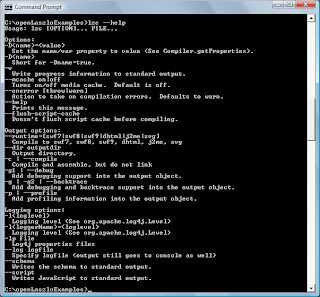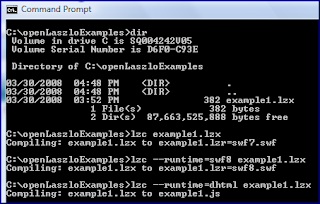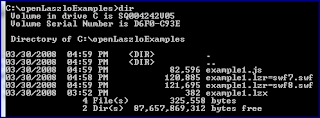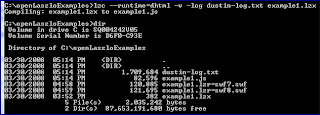Two very important first steps when using the OpenLaszlo command-line compiler are to
1. Set the environment variable
LPS_HOME to the directory in which OpenLaszlo is installed or unzipped. For example, I have OpenLaszlo unzipped in C:\openlaszlo, so I set my environment variable as OPEN_LASZLO=C:\openlaszlo.2. Place the OpenLaszlo directory with the
lzc executable in your path. On my Windows machine, with LPS_HOME set as described in step #1, I add the following to my path: %LPS_HOME%\WEB-INF\lps\server\bin.You know you have been successful with these first two steps if you can run
lzc --help from your root directory and see something like the following screen snapshot (click on snapshot to see larger version).
As this
lzc --help example demonstrates, these are several lzc compiler options you can use. These are described in greater detail in Chapter 49 ("Understanding Compilation") of the OpenLaszlo Application Developer's Guide.The command-line option you might use the most is the one that controls the supported runtime to compiler the OpenLaszlo application code to. Although the
--runtime compiler option in the --help display shown above indicates that swf9, j2me, and svg are possible runtimes to specify, these are actually simply reserved for future use and will instead compile to DHTML if specified. The listed runtime options that actually are currently supported are swf7 (the default if no runtime is specified), swf8, and dhtml.The next screen snapshot shows how to use the command-line
lzc compiler to compile to the three primarly supported runtimes.
The commands above will lead to the generated files shown in the next screen snapshot.

As the screen snapshot above shows, the runtime environment of the compiled files is easy to determine from the name of the files.
The
-v option for the lzc command-line compiler prints out compiler progress. The output from the -v option is highly verbose, so you'd probably want to specify a log file with that option. The next screen snapshot demonstrates the use of these two command-line options together.
Note how large this log file is. Note also the relative size of the source file (
example1.lzx). The log created from the -v option is 4475 times larger than the source file being compiled and nearly 21 times larger than the compiled example1.js file. In other words, you definitely want to specify a log file for the -v output.There are many advantages to using OpenLaszlo's Deployer's Console or using URLs with request types (lzt) and Laszlo runtime (lzr) as URL parameters. However, there are times when the command-line compiler is advantageous (such as part of scripted builds).
No comments:
Post a Comment